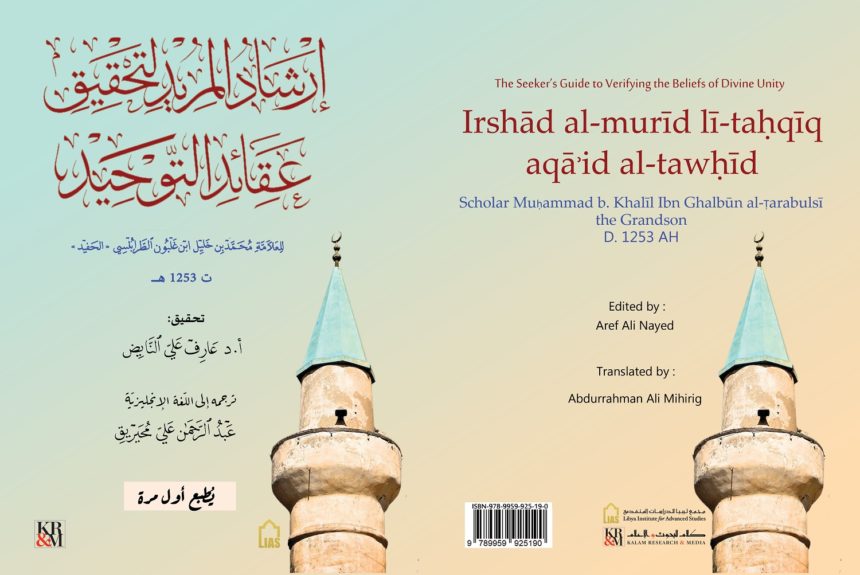إِرْشَادُ الْمُرِيد لتَحْقِيقِ عَقَائِدِ التَّوْحِيد
للعلاّمة محمد بن خليل ابن غَلْبُون الطّرابلسي “الحفيد” (ت1253هـ)
اعتنى به: أ.د. عارف علي النايض ، ترجمه إلى اللغة الإنجليزية: د.عبد الرحمن محيريق
الكتاب من منشورات مجمع ليبيا للدراسات المتقدمة، ومؤسسة كلام للبحوث والإعلام 2020، وتوزعه مكتبة الكون في طرابلس والقاهرة، ودار البيان في بنغازي.
هذا الكتاب
هذا عمل عقديّ لعالم من بلادنا الحبيبة ليبيا، كان مخفيًّا في إحدى المكتبات، وأكلت الأرَضةُ شيئا منه، أقدّمه للقراء والباحثين، ولأبناء بلادنا ليطلعوا على ما خطّته أيدي سادة وقادة وعلماء هذه البلد الأكابر رحمهم الله ورضي عنهم وجزاهم الله كل خير.
يُعتبر هذا العمل من الأعمال المختصرة جدًّا، ذلك أنه حوى في وريقات قليلة قواعد وأصول عقائد أهل السّنة، على مدرسة السادة الأشاعرة، بحيثُ يكون هذا المختصر مقرّرا دراسيًّا سريعًا ومكثّفا في المدارس والزوايا، حتى إن مؤلفه قال إنه أتمه تأليفه في ساعة واحدة فقط.
إن هذا الكتاب على صغر حجمه لبنة من لبنات المدرسة العقدية الليبية، التي ساروا فيها على مدرسة أهل السّنة الأشاعرة، جمعًا بين العقل والنقل، وقد كتب علماء بلادنا في العقائد السُّنيّة الأشعرية أكثر من مائة وخمسين كتابًا بين تأليف ونظم وشرح وحاشية.
الجديرُ بالذكر أنّ هذا الكتاب كُتب في فزّان، وقرأه الطلاب على مؤلّفه هناك، ونسخته الخطّية الوحيدة تحتفظ بها المكتبة الأزهرية العامرة، ضمن محتويات رواق السادة المغاربة.
وفي هذا كتاب ترجمة للمؤلف، ونصّ كتابه المحقّق، وترجمة باللغة الإنجليزية لهذا الكتاب، نضعُه بين أيدي الكتّاب والباحثين.
This Book
This text we present here is a doctrinal treatise by one of the scholars of our beloved homeland of Libya. The manuscript was hidden in a library, where its edges were being eaten away. I present it here to readers and researchers and to the younger generations of our country in order for them to see what was produced by the scholars of this country, God have mercy upon them and grant them His favour.
This text is quite compact and manages to summarize the general principles of Sunni doctrine according to the Asharī school in a few pages. As such, the text is appropriate as a primer to teach in schools and lodges (zāwiyas). As the author himself notes, it took him only an hour to compose.
Despite its brevity, this text represents a building block for study of doctrine in Libya which followed the premier school of Sunni thought, the Asharī school, which combined reason with revelation. Many scholars of our country have authored books in the Asharī tradition, totalling over 150 texts of various types, from didactic poems, commentaries, and glosses.
It is noteworthy that despite the fact that this text was authored in Fizzān, the southern province of Libya, and was studied by students there, the only extant manuscript we have been able to find was contained in the illustrious library of al-Azhar, contained within the collection of the Riwāq al-Maghāriba (the Maghrebi Quarters).
This book contains a brief biography of the author, an edition of the manuscript, and an English translation of the text, all of which we present to readers and researchers of Islamic theology.


